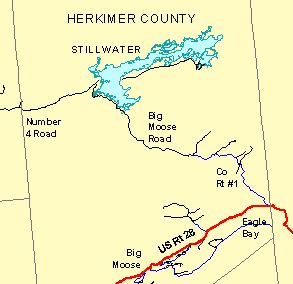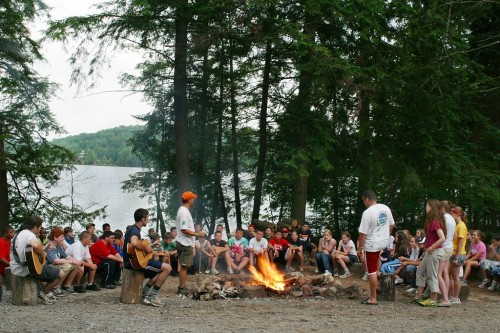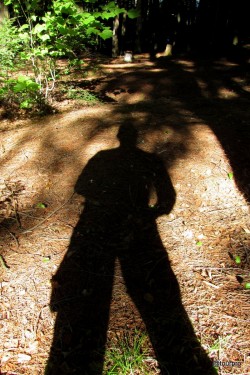 The New York State Department of Environmental Conservation (DEC) today announced that the public parking and use of Stillwater Reservoir at the end of the Stillwater Road will be much improved for the coming summer recreation season. The Reservoir is located in the Adirondack Forest Preserve, Town of Webb, Herkimer County. Related issues have been resolved through the use of Temporary Revocable Permits (TRP) allowing for limited private use of state land at the Stillwater public dock and Grassy Point.
The New York State Department of Environmental Conservation (DEC) today announced that the public parking and use of Stillwater Reservoir at the end of the Stillwater Road will be much improved for the coming summer recreation season. The Reservoir is located in the Adirondack Forest Preserve, Town of Webb, Herkimer County. Related issues have been resolved through the use of Temporary Revocable Permits (TRP) allowing for limited private use of state land at the Stillwater public dock and Grassy Point.
“Parking and use of the docks at Stillwater by the public who are recreating on the Reservoir had become increasingly difficult due to the private uses of these facilities,” Judy Drabicki, DEC Regional Director said. “Through increased enforcement, the involvement of State Senator Seward, Town of Webb Supervisor Robert Moore, the Beaver River Property Owners Association and the Thompsons, we feel there is a solution that will greatly enhance the public’s use of the Stillwater facilities – which were built for them to use on these public lands, while still allowing for limited private uses of these facilities.”
 State Senator James L. Seward said, “Working together, the state, the Town of Webb and property owners have forged solutions which recognize the unique situation of Beaver River and its taxpayers, both year round and seasonal, and address the varied pressures on this beautiful and attractive lake wilderness. The agreements and actions announced today respect the history of the area, its unique needs, and the state’s role in overseeing and protecting forest preserve lands for all people.”
State Senator James L. Seward said, “Working together, the state, the Town of Webb and property owners have forged solutions which recognize the unique situation of Beaver River and its taxpayers, both year round and seasonal, and address the varied pressures on this beautiful and attractive lake wilderness. The agreements and actions announced today respect the history of the area, its unique needs, and the state’s role in overseeing and protecting forest preserve lands for all people.”
Town Supervisor Robert Moore said, “We appreciate the willingness and efforts put forth by all parties involved in seeking solutions for the challenges we faced related to Stillwater parking and Beaver River docking and access. I would be remiss not to expressly thank Senator Seward and the DEC staff for having empathy and seeing things from others point of view.”
Parking Lot
In September 2009, the Department sent letters directing those who had left their boats and trailers unattended in state parking lots in Stillwater to remove them. In the spring 2010, DEC posted signs stating that parking is limited to people who are present at that time on the reservoir or surrounding land and that parking for more than four days without a valid camping permit is prohibited.
Beaver River is a hamlet of 125 seasonal residents, a handful of permanent residents, and two businesses east of Stillwater reservoir which is surrounded by Forest Preserve and no road access. Despite concerns that the parking enforcement would inconvenience Beaver River residents who want to leave their boats in Stillwater they have been able to find alternatives parking arrangements. The local DEC Forest Ranger has received a number of compliments from the public because of the increased availability of parking.
Use by Thompsons of Public Dock at Stillwater
The Thompsons increasing commercial use of the public launch site over the past few years resulted in severe restriction of the public’s access to Stillwater Reservoir. That use included: a barge for hauling people for short day trips to their facility at Grassy Point and for longer term visits and for hauling supplies to the residents of Grassy Point.
This issue was resolved by the issuance of a TRP to the Thompsons limiting the time and location of docking their boats, while allowing them to transport people and goods as needed.
Grassy Point Docks
The state owns Grassy Point and the surrounding land on Stillwater Reservoir near the hamlet of Beaver River. Despite the belief by landowners in Beaver River that the docks they keep at Grassy Point are “public,” these docks were private structures on Forest Preserve and are not allowed.
The issue was resolved by discussions between DEC, the Town of Webb and the Beaver River Property Owners Association. The Department issued a TRP to the town allowing them to have docks at the end of a town road that leads from Grassy Point to Beaver River. The town, in turn, entered into a license agreement allowing the Beaver River Property Owners Association to maintain the docks on the road right of way.
Stillwater Reservoir
Stillwater Reservoir is spread over 6,700 acres and offers a multitude of recreational possibilities. The primary draw to the public is the undeveloped, remote camping on both islands and along the shoreline but also includes remote wilderness camping, canoeing, boating, fishing, hunting, snowmobiling, and cross-country skiing. The area receives considerable use during each of the four seasons. Camping within 150 feet of the high-water mark is limited to 46 sites designated and marked by the Department. Surrounding the Reservoir, there are two major classifications: the Five Ponds Wilderness Area on the north and the Independence River Wild Forest on the southern shores. During recent years, popularity of the Stillwater Reservoir has greatly increased. In an effort to alleviate some of the problems and preserve remote camping opportunities, campers are now required to use only designated sites along the shoreline or to camp at least 150 feet inland from the high-water mark. More information including a map outlining these specific areas is available on the DEC website.
 It’s only a few weeks before school ends for the summer and you haven’t planned any way to occupy your child/children for the summer? No problem. Look no further than the New York State Department of Environmental Conservation’s (DEC) summer environmental education camps! At $350 a week these camps are a terrific bargain, half the price of camps run by other non-profits, and they offer amazing opportunities for your child to learn and interact with the natural environment. If exploring a forest, swamp, lake and a field or fishing, hiking, canoeing, swimming, star gazing and meeting professionals in environmental fields sounds like a great way to spend a week of the summer, then we have a camp for you!
It’s only a few weeks before school ends for the summer and you haven’t planned any way to occupy your child/children for the summer? No problem. Look no further than the New York State Department of Environmental Conservation’s (DEC) summer environmental education camps! At $350 a week these camps are a terrific bargain, half the price of camps run by other non-profits, and they offer amazing opportunities for your child to learn and interact with the natural environment. If exploring a forest, swamp, lake and a field or fishing, hiking, canoeing, swimming, star gazing and meeting professionals in environmental fields sounds like a great way to spend a week of the summer, then we have a camp for you!

 State Senator James L. Seward said, “Working together, the state, the Town of Webb and property owners have forged solutions which recognize the unique situation of Beaver River and its taxpayers, both year round and seasonal, and address the varied pressures on this beautiful and attractive lake wilderness. The agreements and actions announced today respect the history of the area, its unique needs, and the state’s role in overseeing and protecting forest preserve lands for all people.”
State Senator James L. Seward said, “Working together, the state, the Town of Webb and property owners have forged solutions which recognize the unique situation of Beaver River and its taxpayers, both year round and seasonal, and address the varied pressures on this beautiful and attractive lake wilderness. The agreements and actions announced today respect the history of the area, its unique needs, and the state’s role in overseeing and protecting forest preserve lands for all people.”


